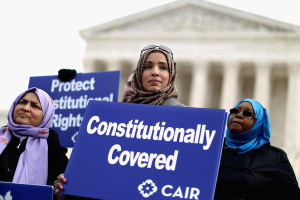By Timothy Aderman
This week, the U.S. Supreme Court (SCOTUS) ruled in favor of Ms. Samantha Elauf in what constitutes a major show of support for Title VII of the Civil Rights Act of 1964. Title VII prohibits employers from applying discriminatory hiring practices on religious grounds. Ms. Elauf had applied to the clothing store Abercrombie & Fitch in 2008 and wore a hijab to the interview. Although she seemed to be an ideal candidate, her hijab was found to contradict the store’s employee fashion policy and she was not hired.
The Equal Employment Opportunity Commission filed suit on behalf of Ms. Elauf. At the District Court, the court sided with Ms. Elauf. However, on appeal, the 10th Circuit Court sided with Abercrombie & Fitch because Ms. Elauf did not explicitly notify the company during the interview that she would need religious accommodations.
E.E.O.C. appealed the Circuit Court’s decision and the case was brought before SCOTUS. In a landslide vote, eight of the nine justices ruled in favor of Ms. Elauf. In fact, the one dissenting voice, the quiet Justice Clarence Thomas, partially agreed with the ruling. The E.E.O.C. applied a failure-to-accommodate challenge as a disparate-treatment claim. That is, Abercrombie & Fitch failed to provide reasonable religious protections and thus discriminated against potential applicants. The majority opinion stated that an absence of an expressed notification of religious accommodations by Ms. Elauf was not necessary since the hijab had been worn to the interview.
There are multiple reasons for the public to celebrate SCOTUS’ ruling. The ruling not only clarifies Abercrombie & Fitch’s hiring practices at the time Ms. Elauf applied as an abrasive violation of Title VII. It also illustrates Abercrombie & Fitch’s conceptualization of beauty as being wrongly and too narrowly viewed. Hijabs may be rare outside of major metropolises in the U.S. However, they are a symbol of modesty and beauty. Islam is the fastest growing religion in the world and the Western fashion industry must expand its extremely narrow definition of beauty.
This ruling also coincides with a harrowing rise in Islamophobia. Recently, a horde of neo-nazis wildly waving assault weapons protested Islam in front of a Phoenix mosque. These xenophobic war-mongers expressed disdain for our fellow citizens who fall outside of the conventional idea of what constitutes a U.S. citizen. The racist neo-nazis were blocked by riot police and counter-protesters holding signs, unwavering in the face of provocation.
The SCOTUS ruling in favor of Ms. Elauf should be a note of encouragement to the counter-protesters. The ruling confirms the foundation of the 1964 Civil Rights Act as being wholly integrationist and wonderfully modern. It is a testament to the resilience of the First Amendment’s assurance against unconstitutional restraints to the free exercise of religion. This ruling is not only a win for Islam as a peaceful religion able to coexist in the U.S. but also for all religions that seek to express themselves openly. It directly undermines those who abuse their right to free speech such as the neo-nazis in Phoenix. Ms. Elauf should be proud for representing the true spirit of the U.S.
Photo: Zimbio.com

